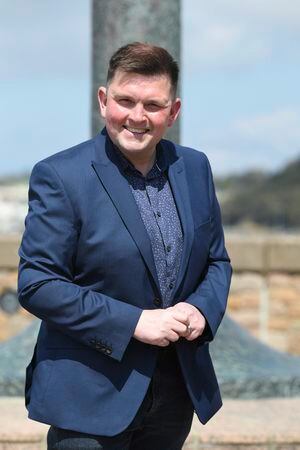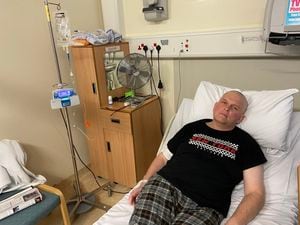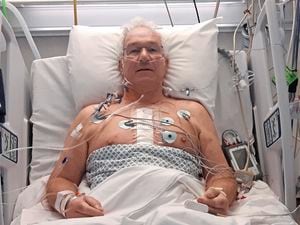‘I don’t want anyone mourning me for years’
From entertaining people on radio and TV to writing a blog about dying, Gary Burgess has touched the hearts and minds of many people in the Channel Islands over the years. Emma Anderson spoke to him about his life, loves and career...

THERE is no question that Gary Burgess is a Channel Islands ‘personality’. Perfect strangers go giddy around him.
There is also no question the broadcast star has made an indelible mark on life in both Guernsey and Jersey. Most people who have had even the briefest of contact with him would say he is insightful, affable, an excellent journalist and a ‘nice guy’.
Most also know that Gary was diagnosed with terminal cancer last November and, given his prolific social media presence, many follow his musings on all manner of topics – not least charting of his own demise. Gary admits that in these past few months he has been having his own ‘pre-wake’ and that he is lucky to be attending his own memorial service.
Gary was born in Bury in Greater Manchester and lived with his parents and his younger brother Paul until, at age 6, his family moved to South Africa for his dad’s work in the steel industry. It was the height of apartheid but, for Gary, it was a paradise.
‘We had three years in South Africa, which was just glorious. I just found it such an exciting, vibrant, colourful, interesting place and, at the time, I didn’t quite understand what apartheid was. We had what were known as servants’ quarters at the end of our garden and Jeanette was our servant – even that word sounds wrong now.
‘She was effectively the housekeeper but she was part of the family and would be sitting on the sofa like the rest of the family with us at night watching telly. You look back on it now actually and think what a strange old world we lived in.’
Gary excelled at school in South Africa and, after their time there, the family returned to live in Blackpool.
‘I loved school, I got a lot out of it. I was a lazy, night-before-things-had-to-be-handed-in student – a clever, lazy student. I was getting straight As at GCSE. You know, I got 100% in one maths exam and they accused me of cheating.
‘I remember distinctly picking up my GCSE results. I got five As, five Bs and a C but I had this profound guilt of seeing others getting Ds and Es, knowing they’d worked way harder than me. It was one of those really interesting moments.’
Gary knew broadcasting was what he wanted to do while still at school. He was one of a team of students who set up and ran a radio station within Montgomery High School. Needless to say, Gary took the lead.
‘So, this would be 1990. I’d go into school every morning at 7am and I’d play golden oldies for the cleaners through speakers in the classrooms and corridors. At lunchtime, I’d play pop music, and then at 1pm I’d do a 10-minute news bulletin that was piped into the staff room for the teachers. After school I’d do another 90 minutes – so my school day was 7am to 5pm, every day. I guess broadcasting settled in my bones.’
Gary’s love of media was also fostered early by a seminal teacher who took the first ever media studies course at GCSE. He credits much of his success to that formative relationship.
‘I loved media studies. It was a brand-new subject when I did my GCSEs. So, effectively, my teacher, Margaret Anderton, and the whole class were learning and finding our way through the subject together.
‘I’m still in touch with that teacher. She is a force of nature and just a wonderful human being. You know that small band of people in your life that often, for reasons you can’t quite explain, sort of shaped you in one way or another? Margaret is one of those.’
It was only at A-levels that the wheels of Gary’s education started to fall off. He came to the stark realisation that he might have to work harder to get the same grades. Within three weeks of starting, he had sacked school altogether.
His parents were less than impressed but Gary said they always allowed him to ‘plough his own furrow’.
Knowing he had to get a job, he worked at McDonalds in charge of the chicken nuggets, the fillet ‘o’ fish and the apple pies – ‘living my best life, it was a means to an end’.
He got his first ‘proper job’ working for the Social Security helpline in Blackpool, spending his day with ‘people mainly screaming down the phone “where’s my claim?”.’
It is also when he got his first real break. He landed a gig presenting the overnight show at Radio Wave that ran from midnight until 6.30am.
He was working overnight at the station and then walking down the road for his day job.
‘About a year into all that, my body stopped working. The skin was falling off my face. I couldn’t wear the headset for the helpline. I was broken.’
Despite no A-levels and no real plan, Gary’s career trajectory seems to be underpinned by an innate ability to land on his feet or be powered by serendipity, as he would say.
He started full time at Radio Wave and within nine years he’d moved through being the breakfast presenter to programme controller, running the output of the radio station, which ‘absolutely transformed my career’.
Gary said he wasn’t quite sure how ‘it’ was going to happen but he knew it would happen. He has never formally applied for a job and it was a succession of lucky breaks that took him through a range of radio jobs with Wire FM in Warrington and a radio group out of Glasgow.
‘Q96 in Paisley had been given a yellow card by the radio authority so I was parachuted in to turn the radio station around. I shut it down and relaunched it in two weeks and the radio authority said they’d never seen such dramatic transformation.’

In May 2003, Gary took a phone call from a radio station on an island he’d never heard of.
‘I knew before the plane landed, looking down at this jewel in the Caribbean-blue water, that this was where I was going to be. Even though I’d signed this 18-month lease on a flat in Glasgow, by the time I had spent a long weekend in Guernsey and was back at the airport, we’d agreed terms.’
Gary was taken on at Island FM as programme director and breakfast show presenter.
‘The breakfast show is a show I know I can do well. That may sound arrogant, but I know I can pull in and grow an audience and that’s exactly what happened at Island FM. Over the course of two or three years, we really tightened the sound of that radio station, sharpened it up, focused on the music. The job is not difficult – it’s love the music and love the area, love Guernsey and love every song you play.’
Gary was lured back to the UK in 2007 to run a group of radio stations out of Liverpool but Guernsey had got under his skin.
‘That was my year away from the Channel Islands. I loved the job, but I wasn’t happy. It took a while to realise I was homesick but homesick for Guernsey and I’d never had that feeling before. I’ve moved around a lot in my life, and I couldn’t quite understand it and so dismissed it for a while, but then, at the end of that year, I resigned this job that I loved, which shocked everyone but it was the right move.’
So, he came back to Guernsey – without a plan.
Gary knocked on the door of BBC Guernsey and said ‘hello, I’m back’ and covered shows when anyone was off and, within a few weeks, they changed the schedule and he was presenting the breakfast show ‘holding people to account’.
‘I was very lucky. I had never done speech radio but some of the best speech radio presenters come from a music background – they know how to keep things tight and bright and moving.’
Gary had been a newsreader at Radio Wave and had absorbed the skill set. What was always there was his journalistic news interest – he is a self-confessed news junkie.
‘When you are listening to an interview, you know the news line that should lead the next bulletin.’
He has an uncanny knack of maintaining cordial relationships with almost everyone he interviews despite never shying away from probing questions or critical comment.
It is often hard to distinguish whether Gary’s beguiling interview style is an innate gift or a conscious ploy. He would say it is a bit of both.
‘It is mostly politicians, really, when it comes to interviews that are going to have a killer question. I’ve got a reasonable amount of natural communication skills, learned journalistic skills and empathy, so there is a fair amount of tickling their tummy and building rapport.
‘You never lead with the killer question because the interview is over, it’s wasted. I never know what questions I am going to ask. I am led by the flow of the interview and what comes out of a person’s mouth but if there is a reason to strike then, absolutely, I will strike.’
Gary aspired to launch a wellness internet radio station in 2009 and went some way to making it happen. He was just too ahead of the curve and it didn’t get off the ground.
He was courted by Channel TV many times over the BBC Guernsey years and finally he said he’d give it a shot and sailed through his interview and screen test.
‘They asked a standard question about what I thought of the programme and I don’t think they were expecting a forensic response, but they got it and I got the job and it has been the last decade of my life and I bloody loved it.’
After a break-up and struggling with Guernsey’s then housing rules and accommodation costs, he moved to Jersey in 2012, but he won’t ever make himself choose which island is better as he loves them both.
‘I love both islands for different reasons. In Jersey there is more space and stuff to do, whereas Guernsey is just the comfiest pair of slippers and I feel so happy whenever I am there. It is a big hug of an island.’
So, compelled by his new role in telly, Gary made the move to the other island. Like all good modern relationships, he met his husband after resurrecting an old dating app in 2014.
‘I got lots of messages from very forward potential dates. That didn’t interest me and then I saw Alan Stirling. I sent him a message saying, “hello, you look normal, do you fancy a coffee?”
‘It wasn’t love at first sight. We just nattered away and date one turned into date two and from there on in we spent a lot of time together.
‘We never had a moment where we discussed moving in. Everything just kind of happened by osmosis really and, before you know it, we seemed to be living together.
‘I liken our relationship to mould. You don’t sort of notice it and then suddenly mould is everywhere. That’s a crap analogy, isn’t it? But I kind of mean it. You just don’t notice love and the foundations of a relationship creeping up on you and the roots being laid and then you realise how much that person is adding colour and vibrancy to your life.’
Gary and his partner of four years, Alan, set the date to get married in 2018 but the legislation was delayed so they had their wedding ceremony and celebrations after entering into a civil partnership – later converting their certificate to one of marriage. He is very proud that they hold the number one certificate for that conversion.
‘It was a magical day with 120 people, including all my family. In years previously I never saw the need for equal marriage but it really changed for me – why make any distinction for men or women or whatever?
‘It was less of a display for other people and much more a reaffirming to each other that you are in it for the long haul – good, bad, ugly, sickness and health. Oh my word, you think about that context of those words now.’
Gary said he never really thought about his sexuality being ‘different’. He just always knew he was intrigued by men and not women. His mother had pretty much sussed out that he was gay but coming out to his dad, at 19, had been hard.
‘My dad, a man’s man, down the working men’s club, kind of exploded when I went over to tell him. He did not take it well and stormed out but it was just the heat of the moment and since then he has been nothing but utterly amazing. He loves Alan to bits and has been totally supportive over the years.’
Gary said he has been in love only twice and, thankfully, one of those times is with his husband.
‘I have said I love you many times but that true, to your bones, love – where if the person wasn’t there, it would break you… yeah, twice.’

It is impossible to interview Gary without finally getting around to dying. His doctors say he has a couple of good months to see his loved ones and sort his plans before he will find his energy levels progressively reducing.
The many fans of Mr Burgess may wonder if his jubilant, positive, can-do attitude is taking a beating given what he is now going through and the untimely death he faces. His lust for life and his joy for human connections, travel, words and relationships remain fully intact.
In a cruel twist of fate, this is his second cancer experience. He had testicular cancer at 23, with chemo, surgery and scars. You could say it was a test run and the first time he contemplated an early death.
‘I had 10 years of medical follow-up and was then signed off as healthy. The medics said it wouldn’t come back, but here we are.’
He writes a blog about dying – mostly because he cannot get around to everyone with calls or visits. He is prolific on social media and adores it. He has touched many people also experiencing similar events in their own lives through his online musings. He is all out there.
No subject is taboo.
But he is no Pollyanna. He cries, he is in pain, he sleeps a lot but somehow his joy and his appreciation of life have exponentially grown with his diagnosis.
He literally stops and smells the roses and watches the bees and butterflies in his garden when he wakes at 3am to have some quiet time. He speaks to everyone who stops him, although he has got better at being honest and saying he is not feeling great.
Throughout three hours of interview, the one word that pops up with Gary every few minutes is serendipity.
He believes his life has been a series of chances – happy, beneficial, unplanned events, and he even believes he has been lucky in the way he is dying.
‘The journalist in me sort of observes what’s happening to me and thinks “oh, this could be interesting”. It might be a cliche, but if my communications help one person somewhere – and I already know it has – I will die happy with that.’
Gary has been given a ball park death date of November by some doctors, later by others. He said he is not scared of dying and is at peace with it. He feels lucky to have the time he has to see people.
‘I am lucky. I know dying at 45 isn’t lucky but I get to have my own pre-wake. I get to experience this incredible outpouring of love and care from so many people. I get to say all the things that need saying and do all the things that need doing. I would call that pretty lucky.’
Gary has left nothing undone. He wants to die ‘comfortably, wherever is the least inconvenient’.
‘I take a lot of comfort in my marriage, family and my home – food, warmth, shelter and love. It is likely I will sleep more and more each day until I just fade away, not in pain, just sleeping.’
He said he is determined his loved ones, particularly Alan, will not get stuck in a grief cycle.
‘Life really does go on. I don’t want anyone mourning me for years. I want my loved ones to be happy and I want Alan to be open to meeting another Mr Right.’
As to what he wants to leave behind, he said he hopes people will treat each other well.
‘In the news, we tend to highlight and interview the outliers, the “bad” people, but I have an inherent belief in the goodness in people. I see it every day.’
What about the killer question… What is the meaning of life?
‘For me the meaning of life is purpose – stamping something on the planet that makes it a shade better than it was before.
‘If everyone does that, progress is made.’





